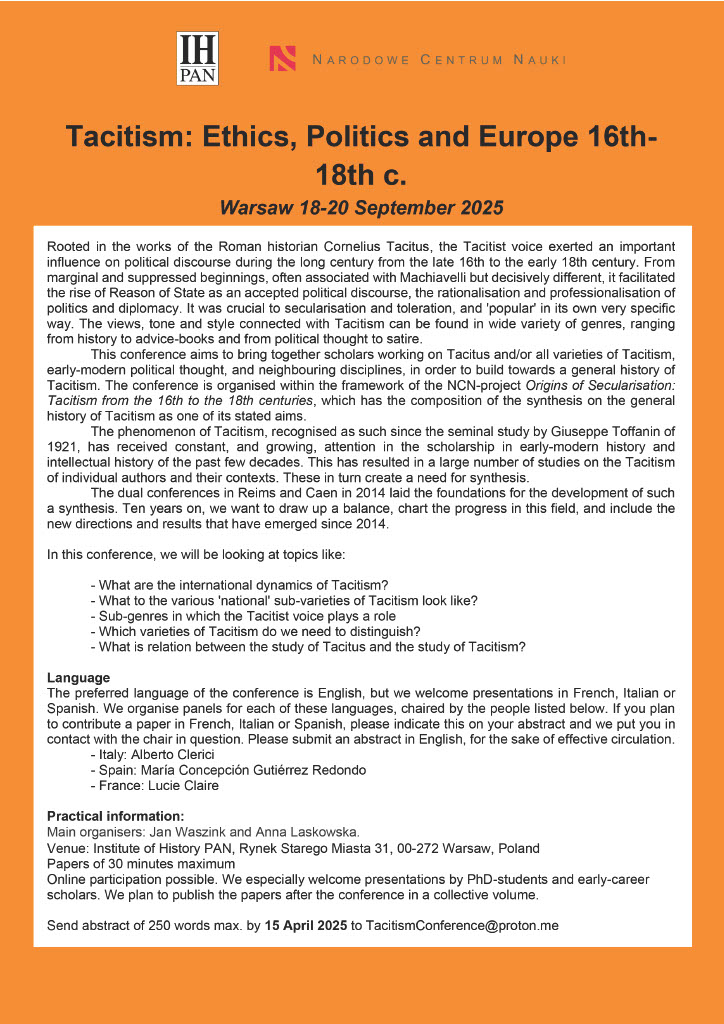Leuven, 22-23 May 2025
The 17th Jozef IJsewijn Lecture will take place on Thursday 22 May 2025, at 5pm, in the Justus Lipsius Room of the Erasmushuis (8th floor; Blijde Inkomststraat 21, 3000 Leuven), and will be delivered by Professor Aline Smeesters (UCLouvain). The lecture will be followed by a reception at 6pm in the big hall of the Erasmushuis on the ground floor. Attendance is completely free, but registration will be required through the link at the bottom of this page. The title of this year’s lecture is The Leuven quodlibetal tradition (1427–1652), at the crossroads of scholastic and humanistic expectations.
Abstract
The lecture will give an overview of the tradition of quodlibetic disputes held at the Leuven faculty of arts almost since its foundation. Every year in December, these disputes were held with great ceremony, attracting an audience of students and professors from all faculties. A patient reconstruction has enabled to document around 40 cases dating from 1427 to 1652, featuring various important intellectual figures such as the future pope Adrian VI, Juan Luis Vives, Petrus Nannius, Johannes Molanus, and Libert Froidmont. Over the course of the 16th century, these disputes, initially marked by a traditional scholastic frame, gradually became full-fledged oratorical performances, sometimes known as Saturnalia. Louvain’s quodlibets offer a fascinating vantage point for observing the tensions and compromises that ran through a rapidly changing academic world. I will focus on early 16th-century debates on the best way to start a disputatio or a declamatio.
The next day, on Friday 23 May 2025, the 3rd IJsewijn Laboratorium will be held at the Couvreurzaal (M01.E50; Edward Van Evenstraat 4, 3000 Leuven, on the Social Sciences Campus). The Laboratorium will have a full-day program devoted to ongoing Neo-Latin research, and has two main aims: (1) showcasing state-of-the-art research in Neo-Latin studies, in terms of both subject and methodology, and (2) bringing together young scholars with established researchers, including the Jozef IJsewijn Lecturer. There is, in other words, no specific thematic focus, and everyone is encouraged to present work-in-progress, paying due attention to both successes and pitfalls in Neo-Latin research, and how to build on, or deal with, them. For 2025, participants are encouraged to engage with Neo-Latin from or about Leuven in the context of the 600th anniversary of KU Leuven, founded in 1425. We aim to have one special session devoted to this theme. The scientific committee will make a competitive selection of abstracts, as we have a maximum of 10 paper slots.
The Laboratorium aims to create an active exchange among the participants, in order to address and discuss promising research perspectives. All sessions will be plenary, including a research pitch by local Neo-Latin students. Each session will last one hour and include two presentations of 15’ each, followed by 30’ discussion time. Presenters will be asked to pre-circulate their materials and ideas in a way they see fit (e.g. a Neo-Latin text with translation and/or commentary, a short paper summarizing the main points of their work-in-progress, an advanced paper not yet submitted for publication, a poster file, …). The only prerequisite is that these materials contain two to three questions you want to see addressed during the discussions. The pre-circulated materials will be shared only with those registered for the workshop and will serve to encourage in-depth discussions. The main workshop language will be English. Abstracts are due 15 December and should be sent to Adriaan Demuynck (adriaan.demuynck[aet]kuleuven.be) and Raf Van Rooy (raf.vanrooy[aet]kuleuven.be). The abstract deadline has exceptionally been extended to 6 January 2025.
The registration fee for the IJsewijn Laboratorium will be €35 to cover catering. (BA and MA students of KU Leuven are exempted from paying the Laboratorium’s fee.) Please register by 1 May through this form.
The preliminary program can be accessed here.
Organizing committee:
Marijke Crab (KU Leuven Libraries), Nicholas De Sutter (KU Leuven), Adriaan Demuynck (KU Leuven), Raf Van Rooy (KU Leuven)
Scientific committee:
Susanna de Beer (Leiden University), Gianmario Cattaneo (Università degli Studi del Piemonte Orientale), Marijke Crab (KU Leuven Libraries), Ingrid De Smet (University of Warwick), Nicholas De Sutter (KU Leuven), Martine Furno (Université Grenoble Alpes / ENS Lyon), Christian Laes (University of Manchester / University of Antwerp), Han Lamers (University of Oslo), Marc Laureys (Universität Bonn), Vasileios Pappas (University of Ioannina), Maxim Rigaux (Universitat Autònoma de Barcelona / Ghent University), Florian Schaffenrath (Ludwig Boltzmann Institut für Neulateinische Studien, Innsbruck), Toon Van Houdt (KU Leuven), Raf Van Rooy (KU Leuven)


